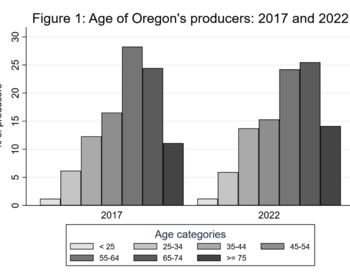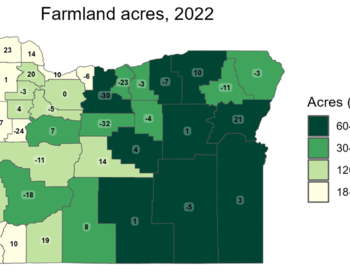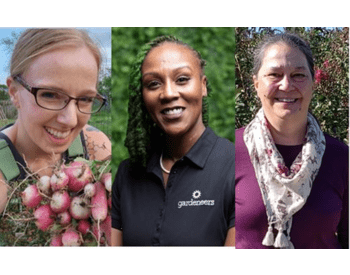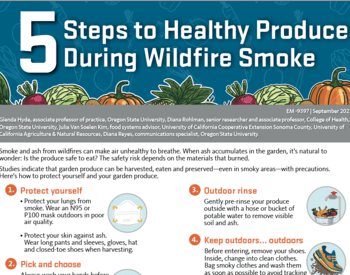Transcript
00:00:14 Rick
Welcome to the farm to school podcast where you will hear stories of how youth thrive and farmers prosper when we grow, cook and eat delicious, nutritious local food and schools. We're your hosts, I'm Rick Sherman.
00:00:28 Michelle
And I'm Michelle Markesteyn. We are farm to school coordinators for the state of Oregon. And today we are making time to talk about the federal level and the people and programs at the United States Department of Agriculture that intersect with farm to school.
00:00:43 Rick
So imagine if you will, a student is enjoying a school lunch or a summer meal at a local park with locally sourced blueberries and a green salad on the plate that takes not only the farmers that grow the food and all the folks in the kitchen that cook and prepare the food, but also paying attention to all the rules governed by the… federal rules at the USDA to meet nutrition standards. Michelle, can you paint a picture for us? What? That federal agency, that overseas school meals looks like?
00:01:17 Michelle
Yeah, sure. The USDA is made-up of 29 different agencies, so it's nearly 100,000 employees. And in those 29 different agencies, which you can imagine tons of structure, one of them is called food nutrition services. And so that food nutrition service, its mission, is to increase food security and reduce hunger. And they do that in partnerships with state and tribal governments. They have 16 programs and there's a lot of numbers, but it's totally worth tracking these 16 different programs fall into three buckets or areas of work. So first you have your Nutrition Assistance programs, things like farmers markets snapped SNAP, and WIC. You have second bucket being food distribution. So these are emergency foods and things like USDA foods and schools. And then that third bucket is called child nutrition programs. So that's all the school meals, summer meals and farm to school programs. And I was thinking of like, It's a lot of government agencies and numbers, but like, just play this out that actually in any given year, one in four Americans, that's 25% of US benefit directly from one of these food nutrition service programs.
00:02:34 Rick
All this takes incredible leadership and organization, and that's where our very special guest comes in to today, please welcome to the Farm to school podcast Administrator Cindy Long, who manages federal administration of the United States Department of Agriculture, Food and Nutrition Service, better known as USDA FNS. Welcome Administrator Long!
00:02:57 Administrator Long
Thank you so much for having me, it's a pleasure to be here.
00:02:59 Michelle
Yeah, thank you. And one thing I want to say too is just thank you so sincerely for your decades of public service, administrator long. Just incredible. Yeah. I'm just really grateful and inspired by you. And just I think about the endless hours you have dedicated. And I'm just really curious about where does your passion and drive for this work come from?
00:03:08 Administrator Long
Well, that's very kind. Thank you. Yeah, well, you know, when I compare myself to other folks who have had careers at FNS, I actually, unlike a lot of them, I really don't didn't have a background in food or nutrition or agriculture. When I when I first started as an analyst at USDA and I thought I would do it for a year or two and suddenly it's 30 plus years later and there's a number of reasons why it has been such a driving passion for me. First and foremost is the mission. So FNS is responsible for helping people have access to food and making sure that that food is nutritious. And if that doesn't get you out of bed in the morning, I don't know. But well, the other piece of it is that we operate 16 different Nutrition Assistance programs that serve a variety of population in different ways and it's just fascinating, interesting things happening all the time and 3rd and also really importantly is that the folks that work in these programs at the federal, State and local level and in the both the public and private sector are just so dedicated and commit committed to the mission. It is just it's a wonderful community to work in and I feel extraordinarily fortunate to have had the opportunity to work.
00:04:37 Rick
OK, well, I'm, I'm glad you said that the state, local and federal level because Michelle and I work on a state level here and in the state where we are, this is kind of A two-parter. Like if you could tell me the role USDA plays in farm to school and school gardens and making school meals healthier, more delicious on national level, and also the second part is how have you seen farm to school grow over the years?
00:05:05 Administrator Long
Yeah. Well, on the first part, USDA FNS's role is you know, as the federal government, we fund all of the Nutrition Assistance programs, you know, including the support that goes through out through the Federal farm to school program. And then we also set requirements and standards for all of the programs. So in in the school meals world, among other things, we set standards for the nutrition quality of school meals. So we're the ones that say, hey, you need to have this many, this much fruit and vegetables and whole grain and low fat dairy on the plate and have sensible calorie limits and reasonable sodium etc., etc. So that's our role and you know in terms of the role farm to school has played in supporting these programs and how it's evolved over time. Gosh, there's, there's just so many ways, you know, when schools have access to local food, whether it's from local producers or their own school gardens, it really helps them. They're in a better position to prepare their own foods right to do scratch cooking or semi scratch, instead of relying on just prepackaged products. And that means they can have control over what's going in the foods. And secondly, when when they're using, you know, fresh local products, they're fresh and they're tasty and kids like them. And it's really, really, critically important that kids like their school meals but also learn to like, nutritious fresh foods and the other thing I'll say about these program, these farm to school act programs and activities is that you know it's amazing how they can form a connection for kids between the kids and food and where food comes from and really the intrinsic bond that people have to food , that really I think changes their perspective on how they think about food and how they consume food potentially for their entire lives. So there's just there's just so much benefit that I've seen these programs provide over the years.
00:07:05 Rick
I'm really glad you said that, and I think I've shared in our previous podcast I was a food service director for 30 years, 20 years in Oregon, and I see I've seen it from all sides, I think. And people sometimes have a preconceived notion of whatever a school meal looks like, but I'm so glad you articulated it the way you did that, it's so much more fresh fruits and vegetables, nutrition quality, whole grains. I really appreciate that.
00:07:35 Administrator Long
Yeah, absolutely. And you know, we just need to keep telling people that over and over because like old stereotypes really do die hard.
00:07:41 Michelle
Well, and you know that's one of our goals with this podcast is demystifying the public policy process and really getting folks more involved in democracy. And so you mentioned rules and standards, and I wonder if you could just paint us a picture of, like, these new standards. How are folks involved in making them and informing them?
00:08:02 Administrator Long
Yeah. Well, so with this particular rule regulation, we knew that it was really important in order to have standards that would work and could really work on the ground in schools for us to get a lot of input. So before we even did what's called a proposed rule, we spent about a year doing, you know, formal listening sessions informal conversations with just a huge range of stakeholders. Whether it was, you know, school nutrition professionals, you know, state and local industry, food industry people who supplied the food and school administrators. And so we really tried to get a lot of, and on and on, Input before we put out the proposed rule.
And when the rule is proposed, it's not in effect and what the government is doing is asking the public to comment and the public really did comment. We got 136,000 comments on what we proposed, which is great. And I know it's hard to believe, but we do read, we do review them all and we take them very seriously. And as a result, the final rule that we put out that...
00:08:52 Rick
Wow.
00:08:53 Michelle
Wow.
00:09:04 Administrator Long
That made some changes to school meal standards. Does was different than the proposed it reflected that input from the public around, you know, a range of topics, including the timing of changes and the of the changes and I think it's a, it's a better product as a result.
00:09:21 Rick
Yeah, it's, it's funny. You mentioned when you announced that you were going to seek input. Then I think all the local areas went to work. I know in our neck of the woods, all of our nonprofits and our state agency and went to the task of asking all of their local people about what do you think about the final rule? What do you think about the standards and stuff? So what happens on such a global scale? At the local national, you know, state level, it's amazing.
00:09:53 Administrator Long
Yeah. And we really appreciate it. It's that that feedback is really essential. So I encourage everybody who listens to this this podcast, if you're, if you're interested in an issue, pay attention to federal regulations and comments.
00:10:05 Rick
Great.
00:10:05 Michelle
Great. Well, we're already nearing the end of our amazing time with you and Mr. Long. Thank you again. And before you go, is there anything else you'd like to tell our listeners?
00:10:15 Administrator Long
Yeah. And in fact, if you'll indulge me there, there are two things I want to say. One of them is that one of the things that it was part of that rule, we were just talking about that final rule that updated the meal standards. One of the things that did is it allows schools for the first time ever to use what's called a geographic preference when they're purchasing food and what that means is that when they go out for a bid. They can specifically say we want this product to be locally sourced, which is great. It allows them to really support their local producers and get that fresh product. And now it's a lot easier because the federal regulations before we made this change made them kind of go through more hoops in order to do that. So that's something that we think is a huge win and we hope we need to spread the word far and wide. The other thing I want to flag is, we announced today a series of grants and supports for school, the school meals programs totaling about $27 million. I want to flag that one of those was a series of grants that have been awarded to help support innovation in the marketplace? So what that means is like supporting good, solid supply chains that will allow new producers, including local and regional producers to break into the market and make sure that schools have a wide range of sources for the healthy and appealing foods they need to serve great meals. So I'm really excited about both of these things and I appreciate the chance to share them with you today.
00:11:43 Rick
OK, we will certainly put links to the geographic preference in the final rule in our show notes.
00:11:50 Michelle
Yeah, definitely. And some other links.
00:11:52 Administrator Long
Wonderful.
00:11:52 Michelle
To in our show notes related exactly to what we do on state and federal level, both what you just mentioned, decreasing barriers and increasing opportunities for more delicious nutritious local foods and schools.
00:12:05 Administrator Long
Great. I appreciate that. OK.
00:12:06 Rick
Thank you so much for joining us on our program today.
00:12:11 Administrator Long
You are more than welcome. I enjoyed speaking with you. Bye.
00:12:13 Administrator Long
Bye. Thank you.
00:12:13 Rick
Bye bye.
00:12:19 Rick
We'd like to thank administrator long so much for joining us on our show today.
00:12:23 Michelle
And thank you everyone for listening.
00:12:26 Rick
The Farm to School podcast was written, directed and produced by Rick Sherman and Michelle Markstein with production support from Leanne Locker, Oregon State University Extension, and was made possible by a grant by the United States Department of Agriculture.
00:12:40 Michelle
The content and ideas of the farm to school podcast do not necessarily reflect the opinions of Oregon State University, Oregon Department of Education, or the United States Department of Agriculture. The USDA, Department of Education, and Oregon State University are equal opportunity providers and employers.
00:12:56 Rick
Do you want to learn more about Farm to school? Check out other episodes, show notes, contact information and so much more by Googling “Farm to school podcast OSU” and it will get you to the site.
00:13:08 Michelle
It will get you there. And we would love to hear from you. So stop by that site Rick just mentioned and say hello or give us an idea for a future podcast.
00:13:17 Rick
We'd love to see you next time. Thanks everybody for stopping by. Bye.
00:13:21 Michelle
Bye. Thank you.
Join us in a conversation with USDA FNS Administrator Cindy Long as we talk about the public's role in shaping school meals.
The Farm to School Podcast is produced by Rick Sherman, Farm to Child Nutrition Program Manager at the Oregon Department of Education and Michelle Markesteyn, Farm to School Specialist at Oregon State University Extension with production support from LeAnn Locher, OSU Extension. The show is made possible by a grant from the United States Department of Agriculture.
Want to connect? We’d love to hear from you!


















